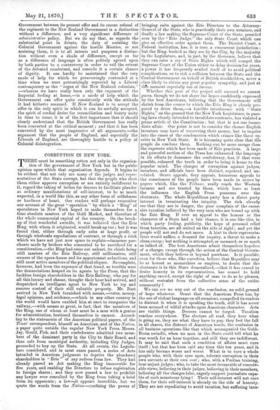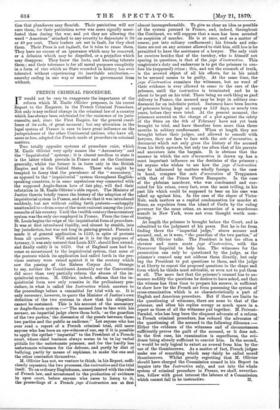CORRUPTION IN NEW YORK.
THERE must be something rotten not only in the organiza- tion of the government of New York but in the public opinion upon which that organization depends. It begins to be evident that not only are many of the judges and repre- sentatives of the State corrupt, but that the people who elect them either approve corruption or are entirely indifferent to it, regard the taking of bribes for decrees to facilitate plunder as ordinary manifestations of self-interest, to be as much expected, in a world like this, as any other form of selfishness or hardness of heart. Our readers will perhaps remember our account of the great " operation " by which a "Ring" of speculators in New York hoped to make themselves for a time absolute masters of the Gold Market, and therefore of the whole commercial capital of the country. On the break- up of that wonderful swindle, it was believed that the Erie Ring, with whom it originated, would break up too ; but it was found that, either through early sales at huge profit, or through wholesale repudiations of contract, or through a trick which we have not just now space to explain—immense pur- chases made by brokers who consented to be sacrificed for a consideration,—the Ring had come out unhurt, its chiefs being • still masters of the Erie Railway, still millionaires, still owners of the opera-house and its appurtenant seductions, and still most active members of the political cliques. So complete, however, had been the exposure of that fraud, so terrible were the denunciations heaped on its agents by the Press, that the luckless foreign shareholders in the Erie Railway, who pay for all this luxury and shame, thought their hour had arrived, and despatched an intelligent agent to New York to try and recover control of their still valuable property. Mr. Burt arrived in New York furnished with means,—votes, money, legal opinions, and evidence,—which in any other country in the world would have enabled him at once to reorganize the railway,—with means so great, in fact, that the members of the Ring, one of whom at least must be a man with a genius for administration, bestirred themselves in earnest. Accord- ing to the statements of the American political papers, of the Times' correspondent, himself an American, and of the Nation, a paper quite outside the regular New York Press, Messrs. Jay, Gould, Fisk, and their confederates admitted two mem- bers of the dominant party in the City to their Board, and thus safe from municipal authority, including City Judges, proceeded to buy up the State. At all events, the Legisla- ture considered, and in most cases passed, a series of Acts intended in American judgment to deprive the plundered shareholders in " Erie " of any redress from law. They had already passed an Act making the Ring immovable for five years, and enabling the Directors to refuse registration to foreign shares ; and they now passed a law to prohibit any lawyer ever consulted by the Ring from taking a brief from its opponents; a law---Tit appears incredible, but we quote the words from the Nation—confining the power of Government between its present offer and its recent refusal of bringing suits against the Erie Directors to the Attorney the regiment to the New Zealand Government is a distinction General of the State, who is practically their own nominee, and without a difference, and a very significant difference of finally a law making the Supreme Court of the State, presided administrative policy. But we do say that, as regards the over by the "Erie Judge," the only State Court which can substantial point in debate, the duty of assisting the give an effective order against them. The District Court, a Colonial Government against the hostile Maories, or not Federal institution, has, it is true, a concurrent jurisdiction ; assisting them, it is to all intents and purposes a distinc- but the Ring, backed as they are by the City, by the majority tion without even a shade of difference, except so far in the Legislature, and, in part, by the Governor, believe that .as a difference of language is often politely agreed upon they can raise a cry of State Rights which will compel the by both parties to a controversy in order to veil the retreat Supreme Court of the Union either to delay decision for years, of the defeated combatant, and concede it a certain chance a power it has frequently availed itself of to avoid political of dignity. It can hardly be maintained that the very complications, or to risk a collision between the State and the mode of help for which we perseveringly contended at a Central Government on behalf of British stockholders, never a time when we were patronizingly reproved by a Liberal class likely to obtain any great popular sympathy, and just at contemporary as the "organ of the New Zealand colonists," this moment especially out of favour. —whereas we have really been only the exponent of the Whether this part of the project will succeed we cannot • Imperial feeling at home,—is a mode of help which the guess, though we do not share the hopes confidently expressed Government can offer quite consistently with the attitude by the best Americans, believing that the Government will it had hitherto assumed. If New Zealand is to accept the shrink from the course to which the Erie Ring is clearly pre- offer in the only spirit in which it can be usefully accepted, pared to drive them,—a forcible interference with "State the spirit of cordial desire for reconciliation and hearty unity Rights," on the ground that the New York Legislature, in pass- in time to come, it is of the first importance that it should ing laws clearly intended to invalidate contracts, has violated a clearly understand that the British Government has really prime article of the Constitution ; but that is not our imme- been converted at the critical moment ; and that it has been diate affair. Our point is not to consider the chance English converted by the most impressive of all arguments,—the investors may have of recovering their money, but to inquire argument that the people of England, and especially the into the cause of the condonation which crimes like these re- Liberals of England, are thoroughly hostile to a policy of ceive in New York State. It is becoming quite clear that the Colonial disintegration, people do condone them. Nothing can be more savage than the exposure which has been made of Erie practices. A largo and powerful section of the Press has exhausted the language in its efforts to denounce the confederacy, has, if that were possible, coloured the truth in order to bring it home to the popular mind. The charges of corruption against judges, members, and officials have been distinct, repeated, and un- refuted. Grave appeals, fiery appeals, humorous appeals to the consciences of the people have been made in scores by papers which, like the Tribune, really reach the Western farmers and are trusted by them, which have at least the influence the English Press possesses over the electorate. The whole Republican party has a direct party interest in terminating the iniquity. The rich already see that they are in danger, the poor complain of the exces- sive taxation inflicted by the very men who are bound up with the Erie Ring. If ever an appeal to the honour or the character of a State had a fair chance, it is one like this, in which party feeling, publicity, the hope of personal relief from taxation, are all united on the side of right ; and yet the people will not and do not move. A hint to their representa- tives would suffice, a demand for inquiry, a threat to make a clean sweep ; but nothing is attempted, or menaced, or so much as talked of. The best Americans admit themselves hopeless of a change, except through the action of the Central Govern- ment, which they believe is beyond purchase. Is it possible, even for those who, like eurselves, believe that Republics may be as honest as monarchies or empires, to doubt that the electorate is in this State demoralized,—that it has ceased to desire honesty in its representatives, has ceased to hold anything sacred, except the right of man to do as he pleases, without restraint from the collective sense of the entire community ?
We can see no way out of the conclusion, no solid ground of hope whatever. Grant that the American Press has, by the use of violent language on all occasions, compelled its readers to distrust it when it is speaking the truth, still it has never been accused of wilful attacks upon American character. Acts are visible things. Decrees cannot be forged. Taxation reaches everywhere. The electors all read, they hear what is going on, they see what they have to pay, they feel the fall in all shares, the distrust of American bonds, the confusion in all business operations like that which accompanied the Gold- Room swindle, when no man in the State could tell what he was worth for an hour together, and still they are indifferent. It may be said that such a condition of affairs must cure itself ; but that has been said any time this ten years, and it has only become worse and worse. What is to cure a whole people who, with their eyes open, tolerate corruption in their own servants at their own cost ; who, with a Puritan training, bear unjust judges ; who, to take the most favourable of conceiv- able views, believing in their judges, believing in their members, believing all the charges false, eagerly support journalists capa- ble of such monstrous lying ? Their self-interest will not cure them, for their self-interest is already on the side of honesty. They are not repudiating to avoid taxation, but suffering taxa-
tion that plunderers may flourish. Their patriotism will not cure them, for their patriotism never was more signally mani- fested than during the war, and yet they are- allowing the word "American" attached to any security to depreciate it 30 or 40 per cent. Their leaders are not in fault, for they elect them. Their Press is not in,fault, for it tries to rouse them. They have no excuse of an ignorance which may be removed, or a delusion which may be dispelled, or a prejudice which may disappear. They know the facts, and knowing tolerate them ; and their tolerance is for all moral purposes complicity in a form of vice which no State-recorded in history has ever tolerated without experiencing its inevitable retribution,— anarchy ending in one way or another in government from without. •































 Previous page
Previous page